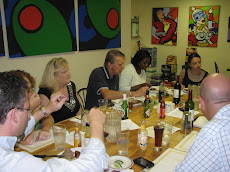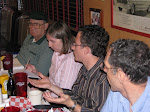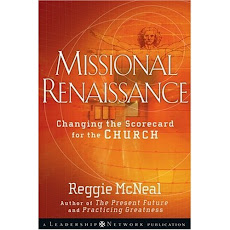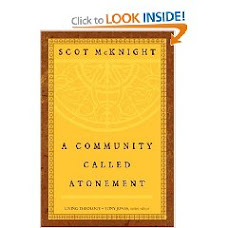 At left: “God” as Grand Dispenser of Good Things, a kind of Mr. Rogers in the Sky. One of the five oddities Scot McKnight describes about how we read the Bible.
At left: “God” as Grand Dispenser of Good Things, a kind of Mr. Rogers in the Sky. One of the five oddities Scot McKnight describes about how we read the Bible.Twelve of us met last Tuesday night, February 3, 2009, at Laura’s Cuban Restaurant in Hollywood to continue our discussion about emerging and missional church and what it means to us. Our topic was how we read the Bible. Robin M. first shared his story about what brought him to the emerging church conversation.
Robin was born in Miami. He was not raised in a Christian household. In fact, his family life was characterized by the kind of broken people, relationships and dysfunction sadly not uncommon to many families today. There was a certain morality in the home though, albeit not spiritual or religious. One of Robin’s early memories was being a shepherd in a school play. (Foreshadowing, no doubt :^) At the age of eight, the family moved to Hollywood. Growing up, Robin found enjoyment in fantasy board games. Upon reaching adulthood, he joined the Army and was sent to Eastern Europe during the Balkans conflict. Two things happened in the Army…during long hours of overnight guard duty and months of time on the base with nowhere other than the beer tent to spend one’s pay. He began to observe two very different cultures. One culture was comprised of hard drinking men who preyed on each other’s wives. Another group of men were heard singing in tents at random times in open air church services. These men spent part of their off time calling their wives on the phone and demonstrating their commitment to their marriages. Robin alternated between the beer tent and exploring the Bible on his own. Finally, one day he felt led to join the men in the prayer tent and to give Jesus a chance to repair his broken life.
After the Army, Robin started attending a large Baptist Church in Hollywood. He was one of the few young adults and didn’t quite fit in with the larger younger or older age groups. As is sadly common today there is a void of people between the ages of 18 & 30 in many churches. With little “community” here, he started to hang around Christians who were a part of other church gatherings. He became Vice President of
Intervarsity where he met Christians from every denomination. This started to take down denominational barriers for him. He met Melissa, the woman who would become his wife, at a Bible study outside of his church. Then he started attending a church that met in a homeless shelter with about a dozen other Christians from different backgrounds, along with homeless people who gathered with them on their own for the service. Here, he became the “associate pastor.” He also started working for a homeless advocacy organization. Robin’s view of “church” began to broaden from the concept of one denomination or “congregation.” Having not grown up in a traditional “church” culture, he never had the baggage that would prevent him from seeing church in a homeless shelter, and community in small numbers, as anything but normal. As Robin put it, he “didn’t know what he didn’t know.”
It was at this time that Robin felt called to attend seminary and become a pastor. This calling was so strong that he felt it was the only option for his life. He and his growing family moved to Canada where he attended
ACTS Seminaries of Trinity Western University for three years, graduating with a Master’s Degree in Divinity and becoming President of the Graduate Student Body. While at ACTS, he became a co-leader in The Journey, a small church network which would become a model for small church planting. Also while at ACTS, Robin started reading books and writing papers on emergent and missional theology and practice. The nail in the coffin of “traditional” church for Robin was attending a church planting “boot camp” where prospective church planters were urged to gather up at least 30 people and publicize a “big day” to launch the new church. Such a “bigger is better” consumerist approach was foreign to Robin and didn’t align with his realities and passions for slow church growth where the emphasis is on growing closer to God and to each other.
Robin currently serves as Executive Director of
The Shepherd’s Way homeless family shelter and hosts or helps lead several small house church and discussion gatherings on emerging expressions of church, including this one. You can also check out his
MySpace and Facebook pages.
After some feedback about his story, Robin facilitated a discussion on Scot McKnight’s paper
Scripture in the Emerging Movement which was presented on Jan. 29, 2009 at the
Seminar on Emerging Church at Calvin College . In one sense, the emerging church movement is a movement of questions. No one writer has all the answers. The Bible is not questioned per se, but questions about
how we know what we know and how we communicate what we know are allowed. The issue is the limitations of language to describe God and His will. Robin started by describing McKnight’s
five oddities surrounding how the Bible is read in church today, since, as McKnight explains,
how one reads the Bible shapes one’s spirituality just as much as one’s spirituality shapes how one reads the Bible.
1.
The Lawbook. It is about commands and prohibitions. People approach the Bible to tell them what to do. Nonconformists are in trouble.
Jim remembered spending years frustrated that he could never live up to the law. Wendy described this kind of Bible reading as a “safe box.” Kelly added that there are “no fuzzy edges.” And Wendy recalled post WWII society in Britain where the Bible was the authority, not so much onerous as safe. Is the Bible “the authority” in postmodern Western society? Steve agreed with Jim about struggling to live up to law until his late teens when he read Romans 13:8-10 “Let no debt remain outstanding, except the continuing debt to love one another, for he who loves his fellowman has fulfilled the law….Love does no harm to its neighbor. Therefore love is the fulfillment of the law.”
2.
A collection of blessings and promises. Reading the Bible this way produces a God who is the
Grand Dispenser of Good Things, a kind of
Mr. Rogers in the Sky. This helps happy people feel happy, but what about those who are struggling?
Kathy said she finds it comforting that the Bible is real and includes people who are depressed and struggling. Jim reminded us of prophets like Jeremiah, and of Apostle Paul when he writes, “…We were under great pressure, far beyond our ability to endure, so that we despaired even of life.” (II Corinth. 1:8). Reading the Bible only for its blessings is a half reading of the Bible.
3.
Rorschach inkblot. We see in the Bible what we want, or what is inside of us.
Kennedy reminded us of Voltaire’s quote, “If God created us in his own image, we have more than reciprocated.”
4.
A massive puzzle. The whole Bible can be made to fit into some underlying
Grand System of truth (except, of course, for the parts that don’t fit). If we can just figure out the system, we’ll lead more godly lives.
Here, we approach the Bible with a hypothesis and look for verses to support it. Kennedy compared it to the highest form of modernism which started with Greek ideas of logic and systematic thinkers like Aquinas. Kelly mentioned how this approach suppresses curiosity about things that don’t fit into the system. If it doesn’t fit, we don’t want to investigate it. We talked about how the great Reformers, like Luther and Calvin, developed their own systems. Robin reminded us that the
Nicean Creed is a very short system that almost all Christian denominations agree on. In fact, these various oddities of reading the Bible can be helpful at times, but not as stand alone systems. Too often, if people base their faith on a systematic theology, it is like building one’s faith on a house of cards. If one card is removed the whole house can come tumbling down, and people can and do lose their faith.
5.
Through the eyes of their Maestro. We read the Bible through the lens of one of its writers whether that is Jesus, Paul, James, Moses or even as understood by Calvin, or Luther, or the Pope. This can make us “one chapter Christians” with a narrow spirituality.
So, how ought we to read the Bible? One emerging way of reading the Bible is to recognize both the adequacy and limitations of language, what McKnight calls,
The Linguistic Turn. Robin compares this to trying to describe the taste of a certain glass of wine. We can’t describe the wine itself, so we compare the complex tastes to what we have experienced, i.e. assertive, barnyardy, balanced, buttery, earthy, oaky, smoky, supple, sweet, velvety and so on. (It is said of wine tasting that it has the most ridiculous vocabulary in the world!) So, if language is limited in its ability to describe wine, how much more so with the Bible and God? According to McKnight, “This is a question that emerging folks want to ask and won’t let go, and they know it has an impact on how we read the Bible and they also suspect – because of raised eyebrows and some false accusations about relativity – that this linguistic turn really does make a difference.” This gives us a theological humility.
We have a Grand Story that the Bible tells, but never completely. Again, as explained by McKnight, “[Paul] tells us that God’s revelation is a gracious ‘mystery’ that was only made known with clarity in Christ (Eph 3:3). That is, the Age of Torah was only a partial disclosure of God’s mysterious plan in Christ. And even here there is inadequacy or limitation…” As Paul concludes in 1 Cor. 13:12: “For now we see in a mirror, dimly, but then we will see face to face. Now I know only in part; then I will know fully, even as I have been fully known.” This doesn’t deny the truth of the Bible. Again, it just tells us that Scripture and its interpretations are dim articulations of the Truth. So, God uses many witnesses and many stories (what McKnight calls “wiki-stories”) over time to reveal His One True Story (or Plot) to us, but never in a way that is final (This is not a commentary though on the finality of the canon.). We are led into worship, and mystery, of the One True Story through the Spirit and through the many stories that transform our hearts.
Kennedy described the Bible as a constellation of witnesses, coming with different perspectives, of one reality. Matthew thought that a movie vantage point, or time line, might be a better analogy than perspective. He said that God shepherds humanity like he does individuals. God has at different times related to us progressively as law giver, or father figure or God of love. He adopts new ways of expressing Himself to us. He gave the example of a homeless man who lives with him who is not allowed to hold money for now, but will need to be able to grow into that responsibility over time. Jerry cautioned not to take witness testimony as the event itself. Steve remembered a quote that “The Bible is not the word of God, but the word about the Word of God (which is Jesus, according to the Bible).” Kennedy compared knowing God to the way a friend, or spouse or child knows us. They all know us in certain ways, but never completely. Wendy added that a child looks at their father relationally and trusts them, but is never their equal. This trust relationship is lost if we have only one way of looking at God’s truth.
Robin summarized that a wonderful aspect of the emerging conversation is that it allows differences, but that we should sit down and discuss them. It gives us space to ask questions and admit we don’t know as much as we think we know in ways many churches claim. At the same time, it’s scary not to have it all figured out. When we think we do though, we often invalidate other’s experiences of God, which can do a disservice. So, if we look at Scripture differently, how will we live our lives differently? How will we interact with people who don’t believe the same way we do? Do we validate their stories, or write them off? How would the church be different if we admit we don’t have all the answers? The emerging movement is trying to figure that out.
We decided to meet again on
Tuesday night, March 3, 2009 at Laura’s Cuban Restaurant in Hollywood to continue our conversation.
Blessings,
Steve

 "Part of the joy of church is worshipping with people you love."
"Part of the joy of church is worshipping with people you love."





















